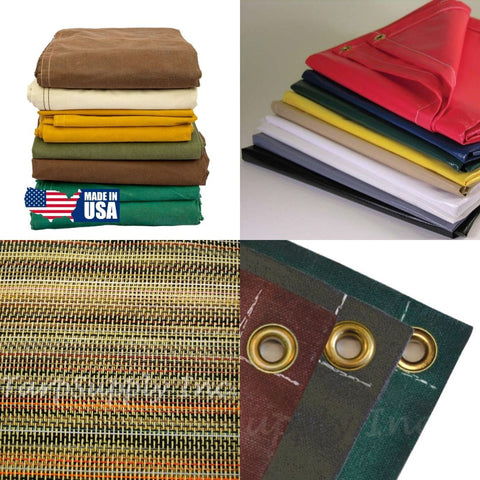When faced with the task of selecting the perfect tarpaulin to suit your requirements, you are bound to come across a plethora of materials in the market. Among these options, poly tarps stand out as a favored choice. Nevertheless, prior to reaching a final decision, it is imperative to grasp the advantages and disadvantages of poly tarps in relation to other tarp materials. In the following discourse, we shall delve into the distinctive attributes of poly tarps and assess their merits vs their counterparts.
Poly Tarps: Versatile and Durable
Polyethylene, commonly known as poly, is a synthetic material widely used in the manufacturing of tarps. Poly tarps are known for their versatility and durability, making them suitable for various applications. They are lightweight yet robust, making them easy to handle and transport.
Weather Resistance: Poly tarps excel in providing reliable protection against the elements. They are UV resistant, meaning they can withstand prolonged exposure to sunlight without deteriorating. This makes them an excellent choice for outdoor applications where constant exposure to the sun is expected.
Waterproof Properties: Poly tarps are designed to repel water effectively. Their waterproof properties make them an ideal choice for covering and protecting items from rain or snow. Whether you need to protect your garden furniture or secure your construction materials from moisture, poly tarps can provide the necessary safeguard.
Cost-Effective: One of the advantages of poly tarps is their affordability. Compared to other tarp materials, poly tarps are often more budget-friendly. This makes them a popular choice for individuals or businesses looking for a cost-effective solution without compromising on quality.
Alternatives to Poly Tarps

While poly tarps undeniably offer numerous benefits, it is prudent to explore alternative tarp materials to discern the most suitable option for your specific needs.
Canvas Tarps: Canvas tarps, with their long-standing history of use, are renowned for their durability and breathability. They possess the ability to resist mildew and provide reliable protection against abrasions. Canvas tarps find common application in scenarios that demand a robust and breathable covering, such as truck bed covers or camping tents.
Vinyl Tarps: Renowned for their exceptional strength and tear resistance, vinyl tarps excel in heavy-duty applications where durability is paramount. Construction sites frequently utilize vinyl tarps, as they can withstand harsh environments and safeguard equipment from dust, debris, and inclement weather conditions.
Mesh Tarps: Distinguishing themselves from other options, mesh tarps offer partial coverage while allowing air and light to permeate through. This unique characteristic makes them an ideal choice for applications such as shade screens, privacy fences, or coverings that necessitate adequate ventilation.
Conclusion
When it comes to choosing the best tarp material, several factors come into play. Poly tarps offer versatility, durability, and cost-effectiveness, making them a popular choice for many applications. However, if you require specific features such as breathability, exceptional strength, or partial coverage, considering alternatives like canvas, vinyl, or mesh tarps might be more suitable.
Remember to assess your specific needs and consider the environment in which the tarp will be used. By doing so, you can make an informed decision and select the best tarp material that meets your requirements.





